Do you live in Portugal or plan to travel there? The safety of local tap water can impact your choices and quality of life. Whether you’re in Lisbon or the southern region, you should know if the water is treated and certified safe for human consumption.
In this article, we’ll discuss:
- Source of Portugal’s tap water
- The risks of drinking tap water in Portugal
- Top cities with the cleanest tap water in Portugal
Is Portugal Tap Water Safe To Drink?
Yes, tap water in Portugal is safe to drink and meets European Union quality and safety standards. Many restaurants in Portugal serve tap water upon request.
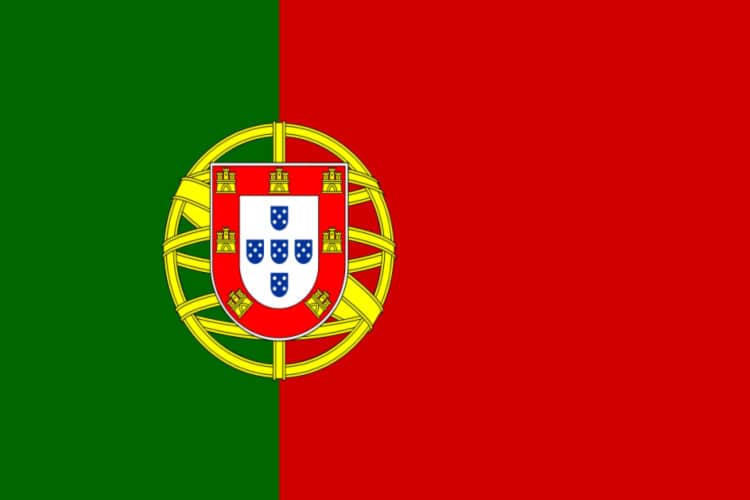
The European Union or EU adopted a new drinking water directive in late 2020. The directive oversees tap water quality in EU countries, including Portugal. While the regulation does not apply to mineral water sources, it does apply to most water distribution systems and bottled drinking water.
Similar to other water safety and quality standards, government organizations set thresholds for monitoring and testing tap water. Those thresholds come from the World Health Organization’s guidelines.
However, city and country authorities can set additional standards that exceed the EU’s drinking water directive.
In addition, some areas can temporarily lower chemical quality standards as long as those thresholds do not pose a human health hazard. Furthermore, the water treatment facility, city, or country has to prove that meeting the directive’s chemical quality standards aren’t possible due to a lack of resources.
Is the Water in Portugal Hard or Soft?
According to borgen project research, Approximately 13.3% of Portugal’s tap water is hard, and 20% is extremely hard. Meanwhile, 28.9% is soft, and 37.8% is quite soft.
Based on these statistics, you are more likely to find soft tap water in Portugal. However, whether the tap water is hard or soft may vary by region.
You might find higher mineral content in tap water in the northern region. If you’re new to the area, you can find out more information about the water quality by asking locals and restaurant employees.
Top 3 Portugal Cities With the Cleanest Water
The quality of tap water in Portugal varies depending on the region. With the help of a map, you can see which regions exceed water quality standards, meet them, or are below standards.
The Faro district in the south, the Braga district in the north, and the Leiria district in the central region are examples of areas that exceed minimum water quality standards.
Cities like Lisbon, Porto, and Algarve have drinkable tap water. Lisbon, in the center of the country, is the capital of Portugal. The city population exceeds two million. Lisbon sits along a river that feeds into the Atlantic Ocean.
Porto is a city located in the north of Portugal. This city, famous for port wine, has a population that exceeds 1 million. Like Lisbon and Porto, Algarve is situated near a river. The city is in the southern region and is known for its golf courses, fish, and wine.
Who Regulates Water in Portugal?
The Portuguese Ministry of Environment and Regional Development is responsible for establishing water quality policies and legislation. However, there is a separate regulatory entity that oversees the national management of its water supply. The Water and Waste Services Regulation Authority also manages wastewater and stormwater.
This authority has three board members that the Ministry is responsible for appointing. Under the Water and Waste Services Regulation Authority is the Water Institute INAG. This authority ensures the EU water directive is implemented and enforced.
If this sounds somewhat complex, it is. You can think of these water authorities as three different branches of government.
The Ministry sets the policies and rules in alignment with the EU and local water directives. A separate regulation authority makes policy recommendations based on local water management and supply.
Finally, the Water Institute INAG is similar to local authorities and ensures Portugal follows water policies and directives. They are like the cops that patrol the streets and monitor traffic.
Where Portugal Gets Its Water From
About 60% of Portugal’s drinking water comes from groundwater sources. Groundwater is a water source that exists below the ground. These sources include aquifers that the land sits above.
Groundwater sources also include wells. The rivers of Portugal provide additional supplies of freshwater. Some rural or remote areas may have separately controlled supplies.
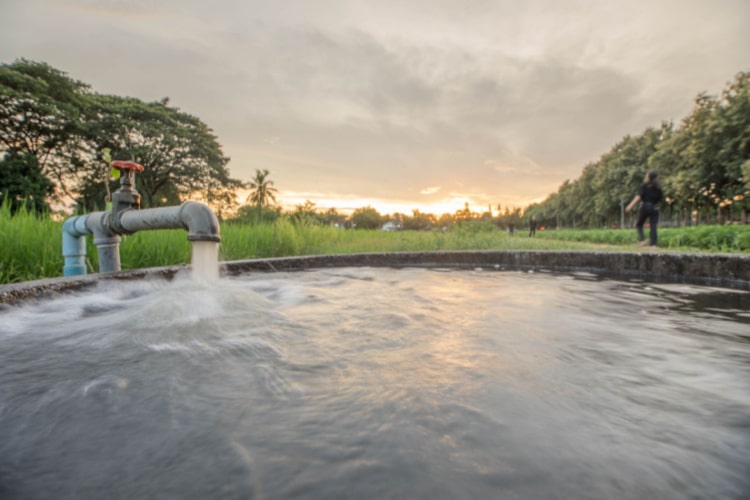
Groundwater requires resources, including infrastructure and labor, to become drinking water. It has to be extracted or removed from beneath the ground.
Groundwater may be fresh, but it can also become easily contaminated from pollution. Treating groundwater can sometimes be more expensive and laborious than treating surface water sources.
You also have to make sure not to destabilize the land above groundwater. Sometimes draining too much water too quickly from aquifers can promote hazards like sinkholes.
While sinkholes can be refilled, they may cause property damages and personal injuries. They also cause inconveniences if they develop in or near infrastructures like roads and buildings.
How Tap Water Is Treated in Portugal
Portugal’s water treatment is mostly treated using chlorine. This chemical can impact the taste of tap water, which is why some locals and tourists prefer filters and bottled water sources.
Depending on the amount of chlorine used to treat tap water, you may be able to smell it. This smell can prompt safety concerns even though chlorine treatment is safe.
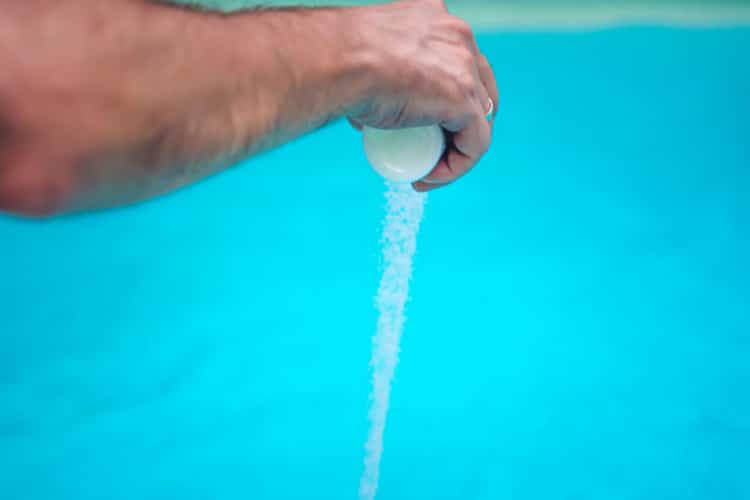
That said, some find the chlorine smell in house or tap water unpleasant and even resort to using bottled water when cooking, bathing, and washing dishes. A whole house filter or a filter that attaches to your home’s main water line can filter chlorine out of water that comes through showers, bathtubs, and home appliances.
People also have different sensitivity levels to chlorine. Some of the effects include throat, eye, and nose irritation. Others can experience gastrointestinal problems, including stomach pains and bloating.
If you are concerned about any treatment chemicals in your water, it may be best to stick with filters and bottled sources.
Is Drinking Bottled Water the Safest Option in Portugal?
Drinking bottled water is not necessarily safer than tap water. However, many locals and tourists use bottled water instead of tap. That’s mostly because of concerns over taste.
Other anxieties include the older condition of water pipes in some areas. Some pipes are 50-plus years old and a few may contain lead.
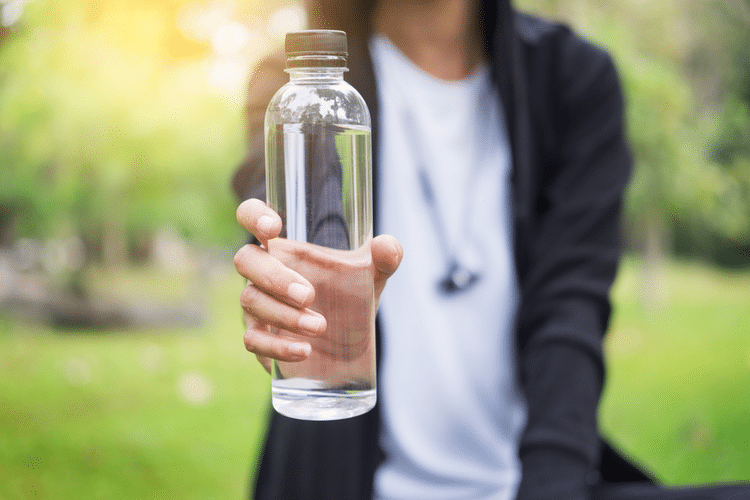
Lead from pipes can seep into tap water if the proper treatment chemicals aren’t used to prevent pipe erosion. Once lead gets into the water supply, it can have harmful and deadly consequences.
The Flint, Michigan water scandal, unfortunately, highlights what can happen when city officials neglect necessary precautions.
While some people may feel safer drinking bottled water, filters may be more effective at removing chemicals. It’s difficult to verify the sources and treatment methods of bottled water.
Just because something tastes better doesn’t mean that it’s the safest option. But in Portugal, locals tend to accept that drinking bottled water is the safest choice.
Are Water Filters Necessary in Portugal?
No, water filters are not necessary for Portugal because the tap water meets or exceeds quality standards in most areas. The only time water filters are necessary is if you were to live in or visit an area where the water falls below quality standards.
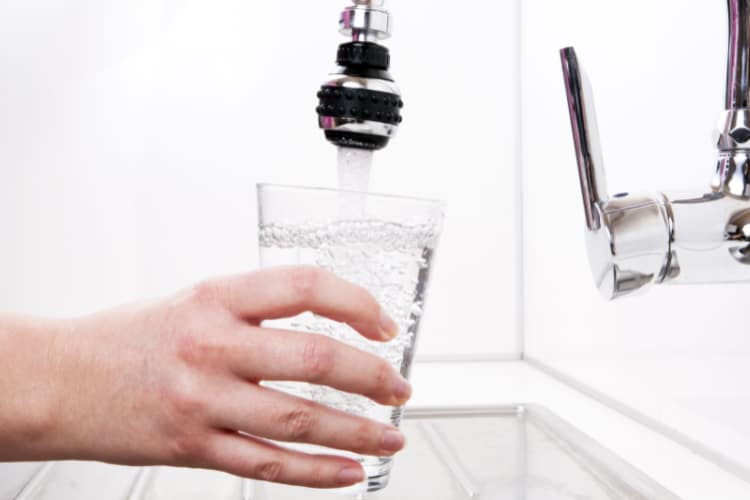
You might also need water filters in more remote areas where there is a lack of resources to oversee and treat the water supply. Water filters that use reverse osmosis filtration methods are usually best. You can buy standalone filters, attach filters to individual faucets, or attach them to the home’s main water line.
Conclusion
If you live in or visit Portugal, it’s perfectly safe to drink tap water in most areas. However, you may find that you want to use bottled water or filters instead of drinking directly from the tap. Since most treatment plants use chlorine, the taste and smell can be off-putting.
You can purchase bottled water or get it from local restaurants and cafes. Standalone water filters or those that attach to your home’s main water supply are more permanent and convenient solutions.
Hello Scott
Your article on water quality in Portugal was very interesting and informative.
I’ve lived in Lisbon for few years but am now moving to Castelo Branco on a farm which doesn’t have any drinking water or stored water.
It has a well which dries in summer. I’ve sent the well water for test alongside the soil.
But I’m very confused in terms of which Authority I should consult for getting the quote for a public water supply to my farm and the process.
Unfortunately my Portuguese lingo is just very basic so I am at loss.
Would be able to guide me as to who should I contact in terms of either Bore well or public water supply cost on my farm?
Looking forward to receiving your positive response.
Kind regards
Rozina
Castelo Branco
Hello Rozina, thank you for reading. I wish you luck on the move and hope you enjoy the new farm. Here’s a resource that I hope will get you to the right place for information: https://www.environmental-expert.com/companies/keyword-drilling-rig-2853/location-portugal